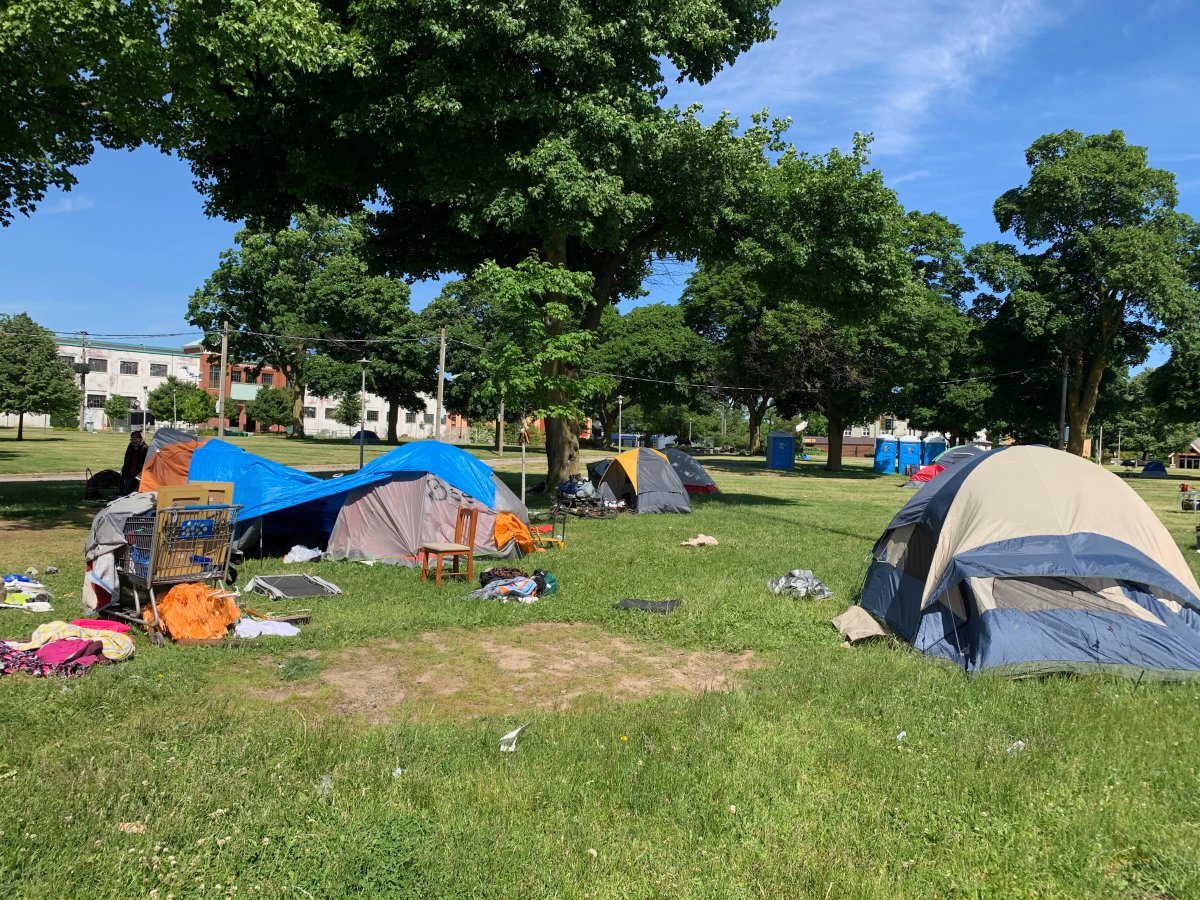A coalition of front-line workers advocating for London, Ont.’s unhoused population says a planned hunger strike will go forward next week after a meeting with city officials ended without a resolution.

The group, #TheForgotten519, gave the city one week to implement three demands aimed at improving conditions for the city’s vulnerable, or offer acceptable alternatives, or one of the members would start a hunger strike on Aug. 2.
In a release Tuesday, the group said a meeting with the mayor and with city staff about their demands ended in disappointment.
“We went into our meeting with the city hoping for serious conversation regarding how to implement these necessary, life-saving changes but we were sorely disappointed,” a statement from the group said.
“The City listened to the direct feedback from well over 100 other frontline workers, and still no resolution. We were told what services were being provided to people on the street. However, we know what services are running. We know what supports are being offered. This is our area of expertise.”
The group’s organizing committee is comprised of Dr. Andrea Sereda, Leticia Mizon of the Ontario Network of People Who Use Drugs (ONPUD), outreach worker Daniel Oudshoorn, and Jenna Rose Sands, the director of SafeSpace London.
The group had demanded that the city:
- Halt the removal of encampments, tents, campsites or squats in parks, along the Thames Valley Parkway, and in empty city lots;
- Transition the role of the city’s Coordinated Informed Response (CIR) Team “from a displacement model, to a team that offers meaningful support … to campers at their campsites,” and;
- Create two indoor spaces providing round-the-clock seven-day support to those deprived of housing and shelter or in need of a safe place to be.
“We know that the demands we have brought forward are not a ‘silver bullet’ or a cure-all for poverty, oppression, apathy, and greed,” the group’s statement reads.
“But the implementation of our demands will make a real, life-giving, and life-saving difference in the lives of those most vulnerable and oppressed Londoners … There was no resolution to today’s meeting, only the offer for another one. In common practice, time and time again, they talk and people die.”
In a previous release, the group estimated that 34 people have died this year among the city’s homeless population, while 74 died in 2021 and 59 in 2020, figures they said were likely undercounts.
According to the city, around 1,850 people are on London’s by-name list, a real-time list of those experiencing homelessness in the community. There are a little over 300 shelter beds in the community, the city says.
Around 325 people in the city are what’s considered to be chronically homeless, meaning they have spent more than 180 cumulative days in a shelter or a place that’s not housing in the last 12 months. Roughly 5,900 people are on a rent-geared-to-income-housing wait list.
In a statement to Global News Monday, the city’s deputy manager for social and health development, Kevin Dickins, said the city was aware of the challenges.
“They’re challenges that I think the entire community has been trying to address for the last couple of years and we’ve seen a lot of new programs, new housing supports introduced over the last couple of years that have had some significant impact,” he said.
“We recognize that homelessness is a very complicated issue, as is the cyclical nature of individuals living with addiction. Recovery is not linear and substance use recovery doesn’t happen overnight.”
He added that one of the key advocacy points from the city to the province has been to increase investment in community-based mental health and addiction supports. The city also continues to advance housing projects at the federal level as well, he said.
Following Tuesday’s meeting, the city wrote in an additional statement to Global News that “we were also disappointed with the outcome of the meeting and are concerned that this new organization does not intend to work with established service providers.”
Below is the complete statement from the City of London:
The issues underlying homelessness, addictions and mental health conditions that are prevalent among our vulnerable population are complex and multi-layered. We know that the people who are experiencing homelessness, struggling with addictions and mental health issues are best served when the work is done collaboratively and with the support of multiple agencies across the system. Unilateral solutions without broad involvement and support have not proven successful.
We have strongly encouraged this newly formed coalition to meet with the London Homeless Coalition to discuss their recommended actions and to also work with them in identifying collaborative solutions. The city has made every effort, both from a financial and resource perspective, to tackle these problems together, on the advice and direction of and with cooperation from community agencies.
In all instances, the first concern is for the health and safety of the individuals and of the surrounding area. In instances where an encampment is not posing any risk to the individuals or the surrounding area, they have been allowed to remain in place. Where encampments have been removed, individuals have been supported.
Every effort is made to safely handle and store personal valuables of people who have moved or during the clean-up of a vacant encampment when valuables are left behind. When staff are engaging with encampments, they also consider food security, availability of water, warm clothing, as other examples of the factors that may impact an individual’s well being.
The City’s focus has and will continue to be on solutions that move individuals towards housing, and we have made progress on that front. We are committed to working together to address these issues and to explore new solutions collectively and collaboratively.
We are concerned about the actions they are demanding. These are complex social issues that require all levels of government, community agencies and other stakeholders to work together to provide public, social and health-related supports.”
— with files from Kate Otterbein








Comments